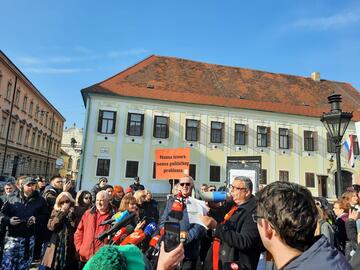
Journalists' protests in Zagreb, February 1, 2024 – photo G. Vale
Several hundred people demonstrated yesterday in Zagreb in front of the government building against the new amendments to the Criminal Code which criminalise the unauthorised publication of the contents of an investigation with penalties of up to three years in prison. According to representatives of the press, it is a "gag law", or rather a "law with bad intentions", as Hrvoje Zovko, the president of the Association of Croatian Journalists (HND), the initiator of the demonstration, nicknamed it.
"No one will dare to inform journalists anymore if they know that they can be mistreated by justice for years. And so, the already widespread practice of corruption will continue", Hrvoje Zovko said yesterday into the megaphone, before asking Prime Minister Andrej Plenković to "withdraw article 307a", otherwise – he promised – "the demonstrations will continue". The text of the law proposed by the government is currently being discussed in the Sabor, the Croatian parliament.
The modification of the criminal code had been announced by the Croatian prime minister already in February last year, when Plenković – stung by yet another scandal revealed by the press and concerning his government – had said: "we will modify the Code of Criminal Procedure and the Criminal Code and situations like this, where information from our archives is made public in an uncontrolled, deliberate, political, selective and organised way, causing political problems, will not happen again".
Since coming to power in 2016, Plenković has had to replace 30 ministers in his government, mostly due to corruption scandals revealed in the press. Precisely for this reason, trade organisations fear that behind the amendment to the Criminal Code suggested by the Prime Minister there is no desire to protect those under investigation from undue publications, but simply to silence investigations into his government's corruption.
Clint Eastwood
"As Clint Eastwood put it, you can't piss on my back and tell me it's raining!", said yesterday Maja Sever, the president of the European Federation of Journalists (EFJ) and head of the Croatian Union of Journalists (SNH). "Andrej Plenković wants to avoid having 'political problems', as he himself said in February 2023", she declared, "but we are not sheep and it is not a problem for us to continue with the demonstrations!". Hence the l last-minute intervention by the Croatian government, which on Tuesday evening had tried to calm the anger of journalists by promising to introduce an exception for facts of public interest into the new article 307a of the Criminal Code. "Who should determine which facts are of public interest?", asked investigative journalist Drago Hedl, who then added, "and who will define who is a journalist and who is not?".
As proposed by the government, the new crime of unauthorised disclosure of investigative content would not punish journalists, but "exclusively participants in criminal proceedings", such as "judicial officials, defendants, lawyers, witnesses, judicial experts and so on", as Croatian Prime Minister Andrej Plenković said in recent weeks.
"Is a journalist someone who has graduated in journalism? Or is it exclusively someone who is employed in an editorial office?", Drago Hedl continued, before adding: "We are not here today for fear of ending up in prison for having published information coming from an investigation, we are here in the interest of the profession, of journalism as a public good, which works in the interest of the community".
Women's rights hostage of the government
Another point that has concerned Croatian journalists is linking the approval of the new article 307a to another amendment to the Criminal Code and the Code of Criminal Procedure, which instead received bipartisan support in parliament. This involves the introduction of the crime of femicide and in general a tightening of penalties for gender violence and sexual abuse and mistreatment.
"This is a new low. Plenković, we will remember you for this!", exclaimed yesterday the president of the HND Hrvoje Zovko, who recalled how the current Croatian prime minister is the one who provoked the greatest number of protests organised by HND during his tenure. Opposition MPs also criticised the government for proposing the two amendments in a single package. "You can have more protection for women victims of violence, but only if you protect me from corruption scandals", summed up MP Sandra Benčić from the opposition Možemo party.
Election year
The changes to the Criminal Code also come at a very delicate moment for Croatia, facing three elections this year. Citizens will vote in June to renew the European Parliament, in September to elect the Croatian parliament and in December to choose the new President of the Republic. Andrej Plenković will lead the HDZ in search of a third term as prime minister and pressure on the media, especially local ones, is already increasing.
The risk is that press freedom will be curtailed in Croatia, particularly in light of the government's recent appointment of a controversial attorney general. This is Ivan Turudić, "who for seven years conducted proceedings against journalist Dražen Ciglenečki because in his article he had compared him to Vojislav Šešelj, and for which [...] he obtained compensation of 90,000 kuna [almost 12,000 Euros, editor's note] for moral damages, after initially asking for almost twice as much", said Sanja Pavić of the non-governmental organisation Gong yesterday. According to Pavić, in Croatia there are currently "concerning regressive trends for freedom of speech and journalism".
Tags: Croatia Media freedom Rule of Law Media capture Media Law
